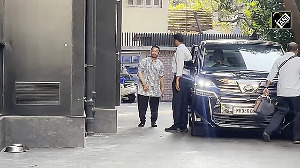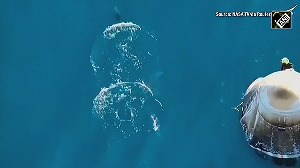Environmental and social activist groups in the country have expressed concern that Japan may dump toxic wastes into India by taking advantage of the proposed comprehensive economic partnership agreement.
"We are concerned that in the proposed CEPA, toxic waste and other banned substances may be included in the list of goods enjoying preferential tariffs. This will incentivise trade of hazardous waste from Japan, which produces it in large quantities," said Gopal Krishna of the Ban Asbestos Network of India, an alliance of scientists, doctors, public health researchers, trade unions, activists and civil society groups.
The concerns are fuelled by Japan's reputation for dumping poisonous and hazardous waste in the south-east Asian countries with which it has free trade agreements.
According to Krishna, Basel Action Network, a Seattle-based environmental action group, recently complained to the United Nations Environment Programme that Japan was using bilateral trade agreements with Singapore, the Philippines, Malaysia, and Thailand to export hazardous wastes like incinerated ash, waste oil and pharmaceutical waste.
These wastes contain residues of highly toxic heavy metals like mercury, lead and traces of organic substances.
Civil society groups in the Philippines have been vocal about the inclusion of toxic wastes in the trade agreement with Japan.
"When BAN did research on the trade pacts of Japan with Singapore, the Philippines and Malaysia, it found that the toxic wastes were eligible for preferential tariff reductions. Moreover, the trade pacts had provisions prohibiting non-tariff measures against poisonous wastes. We hope this doesn't happen with India," Krishna said.
Environmental and social groups have urged the commerce ministry not to reduce the import tariffs on any toxic technology and internationally-controlled or banned waste and substances.
The groups have also urged India and Japan to follow the provisions of the Basel Convention on the Control of Transboundary Movements of Hazardous Wastes, which regulates the movement of toxic waste.
"Due to scarcity of land Japan incinerates its municipal waste. The ash from this incineration, which can be used to make bricks, is highly toxic. India already imports toxic waste from Japan but the proposed CEPA may open the flood gates for such toxic waste to enter the country," said Nityanand Jayaraman, member, Collective for Environmental, Social and Economic Justice, Chennai.
A recent analysis of trade data by Chennai-based Corporate Accountability Desk revealed that Japan exported 2000 tonnes of waste (excluding e-waste) to India between 2003 and 2006. this included 270 tonnes of hazardous trash. Such items included zinc ash, lead acid battery wastes and PVC-coated copper wires, export of which is prohibited by the Basel Convention.







 © 2025
© 2025